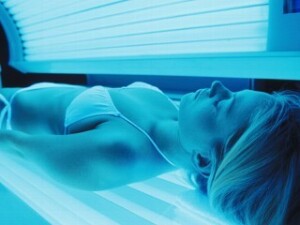by
Brendon Nafziger, DOTmed News Associate Editor | March 24, 2010

Dermatologists think indoor tanning,
which faces a new 10 percent tax,
is contributing to the nation's growing
skin cancer rates.
Indoor tanning is feeling the heat this week. Thanks to the health reform legislation passed on Sunday, the industry is facing a 10 percent excise tax, while on Thursday the U.S Food and Drug Administration will meet to determine whether to apply stricter regulations on indoor tanning beds.
Depending on how it fares in the Senate, which will debate the reconciliation package this week, the tanning tax, set to start as early as July 1, could raise almost $2.7 billion over the next 10 years to help defray part of the health care bills' $940 billion price tag.
The tax on the nation's 25,000 salons replaces the so-called "Botax," a proposed 5 percent tax on elective cosmetic surgery procedures that ultimately got snipped in Congressional wrangling over the final version of the health care bill.



Ad Statistics
Times Displayed: 136882
Times Visited: 7940 MIT labs, experts in Multi-Vendor component level repair of: MRI Coils, RF amplifiers, Gradient Amplifiers Contrast Media Injectors. System repairs, sub-assembly repairs, component level repairs, refurbish/calibrate. info@mitlabsusa.com/+1 (305) 470-8013
For the medical groups that had been lobbying for the tanning tax, it could discourage a practice they say is linked to rising skin cancer rates. But the indoor tanning industry believes the tax will hurt small business owners still reeling from a weak economy.
"It's a regressive tax that's going to fall on an industry already struggling in a recession, a tax on working people, working women," John Overstreet, executive director of the Indoor Tanning Association, an industry group, tells DOTmed News.
The federal tax would be in addition to taxes levied by states - in some places, this would burden tanning salons with almost 17 percent in excise taxes. New Jersey, for instance, with one of the nation's highest state taxes for tanning salons, levies a 7 percent tax on the Garden State's hundreds of tanning parlors.
"This affects small businesses, folks that mortgage their homes to get started, and they're not making a lot of money to begin with," observes Overstreet.
The push for the tax came largely from dermatologists who blame indoor tanning for contributing to the nation's growing skin cancer rates, especially of melanoma, the deadliest form of the disease. According to the American Cancer Society, there were 68,720 cases of melanoma last year, leading to around 8,650 deaths.
"A tax on indoor tanning services would serve as a signal from the federal government to everyone, especially young people, that indoor tanning is dangerous and should be avoided," American Academy of Dermatology Association president David M. Pariser, M.D., said in a statement last year.
Risk controversy
The FDA will try to figure out how dangerous tanning beds really are on Thursday, when the group will gather in Gaithersburg, Md. to hear recommendations from its scientific advisory panel. The FDA is considering upgrading the status of tanning beds, currently Class 1, the lowest risk for medical devices, and also recommending new warning signs about skin cancer risks.

